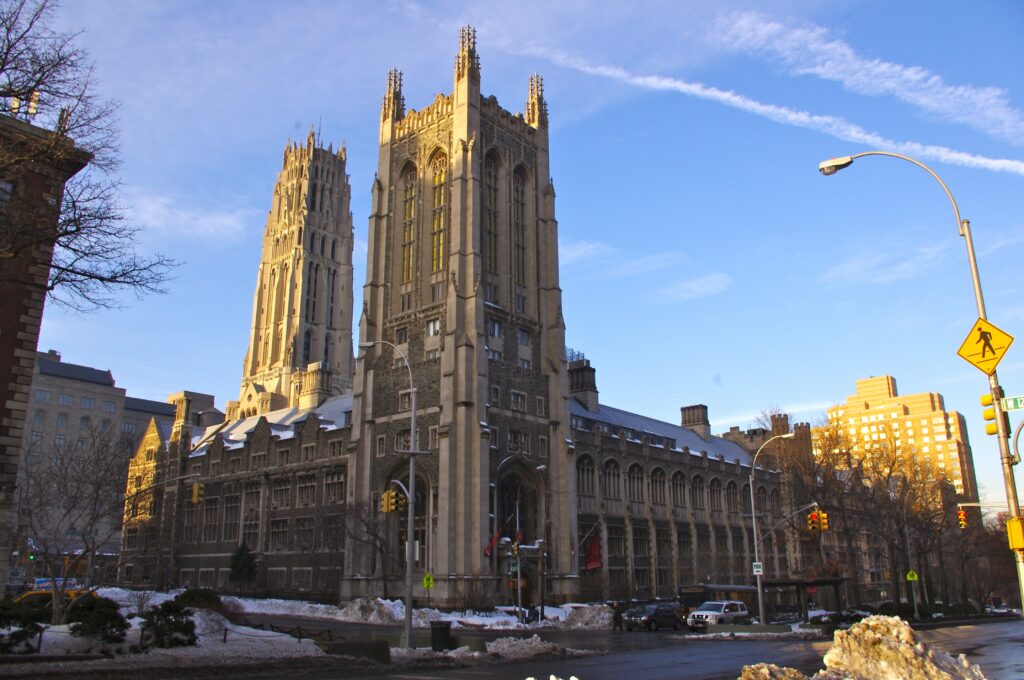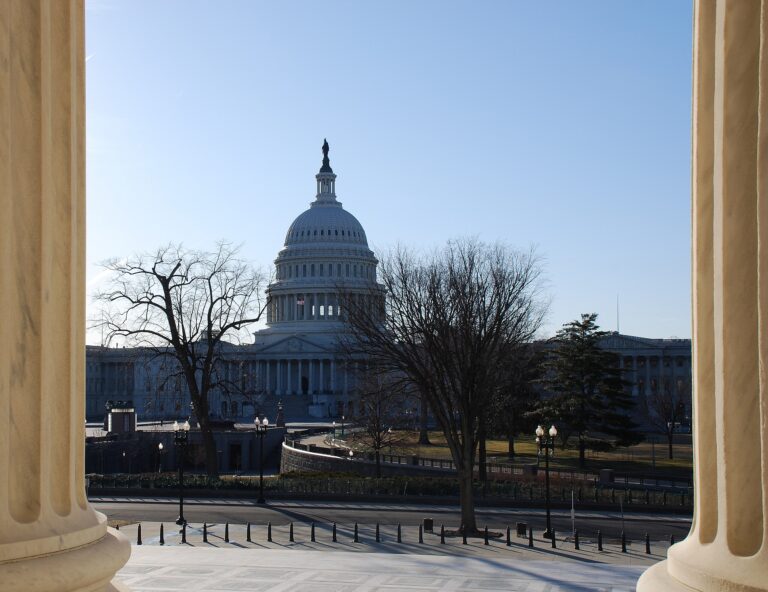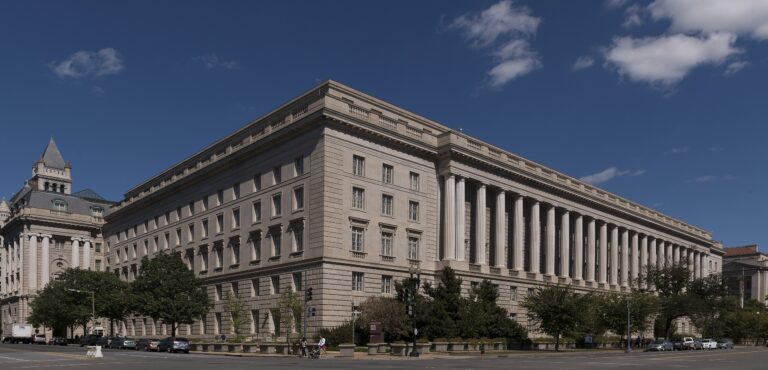
Religious Liberty and Immigration: An Analysis of Recent Legal Claims
Elizabeth Reiner Platt
Union Theological Seminary, New York, NY by David Merrett (CC BY 2.0)
This article is part of our series on Law, Religion, and Immigration. If you’d like to explore other articles in this series, click here.
This essay is an excerpt from a report published in July 2025 by the Law, Rights, and Religion Project at Union Theological Seminary, “Religious Liberty & Immigration: Legal Analysis of Past And Future Claims.” The report explores the growing collision between religious liberty rights and immigration enforcement in the U.S., mapping out the many lawsuits that have challenged a wide range of immigration-related laws, policies, and practices as violations of religious freedom. It then provides a detailed analysis of new opportunities for religious liberty claims in the immigration context.
Migrants have brought religious liberty claims related to many aspects of the immigration system—from requesting religious accommodations in immigration detention, to seeking exemptions from requirements of immigration applications, to claiming religious liberty as a defense to deportation, to claims involving religious worker visas. U.S. citizens have also brought religious freedom claims in an effort to challenge the targeted surveillance and harassment of American Muslims traveling across the border by DHS agents.
Religious Accommodations in Detention
Immigrants being held in detention facilities—including privately run facilities—are entitled to religious accommodations under RFRA (for federal facilities) and RLUIPA (for state and local jails and prisons). People in detention have relied on these laws—as well as, on occasion, the First Amendment—to ensure access to religious needs such as kosher or halal food, articles of clothing like hijabs and turbans, and religious books. RFRA and RLUIPA can also help protect detainees from religiously motivated punishment, harassment, or discrimination by detention center employees. For example, in Jama v. Esmor Correctional Services, a Muslim detainee won a jury trial alleging a RFRA violation for horrendous treatment by guards at a private detention center. The jury’s decision was upheld in an opinion that stated the detention center “had no compelling interest in serving pork to Muslims, throwing Korans in the garbage or on the floor, preventing Jama from praying on the floor, or permitting her naked body to be exposed in the showers and elsewhere. Certainly, there were less restrictive means of serving whatever administrative concerns that defendants may have had.”
While these protections may not apply to immigrants being held outside the U.S. (as discussed further below), they have been an important protection for migrants in need of religious accommodations in detention. They may become even more important as conditions in immigration detention deteriorate in response to the administration’s efforts to massively increase detention and deportation. In a recent news story about so-called “Alligator Alcatraz,” a hastily built detention center in Florida, one man housed there said that in addition to inadequate food, water, and sanitary conditions, workers at the facility “took the Bible I had and they said here there is no right to religion.”
Religious Accommodations in Applications for Permanent Residence or Citizenship
Immigrants have also successfully turned to religious liberty laws to gain exemptions from certain requirements of the visa application process or other immigration-related requirements. For example, in In Re: Chukwuezue Henry Nworu, an Immigration Judge (IJ) initially denied a man’s request for a religious exemption from the requirement to take a blood test as part of a medical examination to establish admissibility, stating that IJs did not have the authority to interpret RFRA.1In Re: Chukwuezue Henry Nworu, 2005 WL 1104255 (BIA Mar. 28, 2005). The Board of Immigration Appeals (BIA), and later the Attorney General, reversed this, holding that “Immigration Judges and the Board are subject to the provisions of RFRA when interpreting and applying immigration law.” Further, the BIA held that Nworu was entitled to an exemption from the blood test, as “requiring [him] to take a blood test was not the ‘least restrictive means’ of furthering the DHS’s compelling interest as there exist other reasonably accurate methods of determining whether the respondent is suffering from a communicable disease.”
In another case, an Amish couple appealed the denial of the wife’s application for permanent residency, arguing that their religious beliefs prevented them from submitting the required photograph for the application2John Doe v. United States, No. 4:18-cv-00162-TWP-DML (S.D. Indiana 2018).. The couple believed that photographs of people are graven images prohibited by the Second Commandment and requested a religious exemption under RFRA and the First Amendment. The case was favorably settled in 2019. In a similar case, U.S. citizen Mohammed Sabra brought a RFRA claim against the State Department after it refused to recognize his daughter’s citizenship and admit her into the U.S. for medical treatment. The Department requested additional evidence of Sabra’s paternity, including a DNA test and photos of Sabra’s wife during pregnancy. The family objected to both on religious grounds; in particular, the decision noted that “for religious reasons, the family is unwilling to provide [photos during her pregnancy] as she is less than fully attired.” A district court refused to dismiss the case, finding that the couple had shown a substantial burden on their religion and “[t]here is a genuine dispute as to whether the Embassy’s request for the DNA testing and Mrs. Sabra’s pregnancy photographs served a compelling interest by the least restrictive means.”
One recent RFRA case seeking an exemption from an immigration requirement was denied by the Second Circuit on jurisdictional grounds, however. Prior to filing the lawsuit, plaintiff Kevin Donely Quezada Palacios had received “special immigrant juvenile status (SIJS),” which provides a pathway to a green card for certain unmarried, undocumented young people. Palacios was later notified that USCIS revoked his SIJS because he was married at the time his SIJS petition was adjudicated. Because his green card application was predicated on his now-revoked SIJS classification, this too was denied. Palacios responded by arguing that he “married when he did as an exercise of his religious freedom,” and that the “requirement that SIJS applicants not be married violates his constitutional right to freely exercise his religion” under the Free Exercise Clause and RFRA. The Second Circuit declined to substantively address these claims, holding that it lacked jurisdiction because the claimant had not filed in the appropriate court.
RFRA has thus been successfully used by immigrants to gain accommodations or exemptions from some requirements of the immigration application process that violate their religious beliefs. That said, such claims may face barriers before certain administrative agencies that are unused to or unwilling to analyze RFRA arguments. As immigration attorney Scott Pollock explained in an article, “agencies like the USCIS and its Administrative Appeals Office (AAO) will often ignore RFRA claims, while deciding a case under the INA and regulations.” Thus, attorneys may need to include RFRA claims in applications for immigration benefits for the primary purpose of preserving such claims for review in federal court, where they may be more likely to be seriously considered.
Claims Related to Religious Worker Visas
A number of religious freedom cases have been brought by immigrants who were denied religious worker visas (or renewals of such visas), as well as by the religious institutions seeking to sponsor them. Such cases have resulted in opinions issued by the AAO or federal courts. Religious liberty claims related to religious workers were specifically contemplated by USCIS within a 2008 rule aimed at reducing fraud in the religious worker program. The agency noted that an “organization or individual who believes that the RFRA may require specific relief from any provision of this regulation may assert such a claim at the time they petition for benefits under the regulation.”
Religious organizations generally enjoy a very broad right to select their employees, especially ministers—notwithstanding regulations such as employment discrimination law—under various doctrines and policies. These include an exemption from Title VII of the Civil Rights Act for religious nonprofits that allows them to prefer coreligionists in hiring and the “ministerial exception” of the First Amendment, which gives religious organizations broad powers over the selection and employment of ministers. Unsurprisingly, such expansive authority over the selection of religious employees has, at times, conflicted with the highly restrictive regulatory system controlling who is allowed to enter and work in the U.S. While the INA creates multiple specialized visas for religious workers, including both ministers and non-ministers, these visas are tightly controlled and contain a host of limits, requirements, and caps.
For example, in Tenacre Found. v. INS, a Christian Science health care facility challenged the denial of a religious worker visa to James Kihu. The INS denied the visa on the grounds that Kihu was in training to become a nurse and therefore did not yet meet the requirement that visa applicants be “fully qualified” for religious occupation. Brought just a few years after the passage of RFRA, the substance of the facility’s RFRA claim was largely ignored in an opinion that focused on whether or not the INA’s decision reflected “an unlawful ‘policy’ of denying R–1 visas to those engaged in ‘training’ while working in a religious occupation.” In Holy Virgin Protection Cathedral v. Chertoff, which involved a Free Exercise and Establishment Clause challenge to the revocation of a religious worker visa to the head sister at a Russian Orthodox cathedral, the Seventh Circuit acknowledged that “courts normally do not interfere in the internal affairs of religious institutions.” It nevertheless held that, in this case, the state was “not dictating any matter of internal religious governance to the Church; it is only making a decision about the secular legal consequences of a given job and pay arrangement.”
Recently, in Calvary Albuquerque, Inc. v. Rubio, South African pastor Stefan Green and the Albuquerque church that sought to employ him brought suit, arguing that the rejection of Pastor Green’s religious worker visa by a consular officer violated their rights under RFRA. The officer denied Green a visa after determining that he had misrepresented a recent trip to the U.S., during which he had been paid by the church for performing services despite entering on a tourist visa. The complaint “alleged that the consular officer denied Mr. Green’s visa because Calvary compensated him and this denial substantially burden[ed] Calvary’s exercise of its sincerely held religious belief that ministers should and must be compensated.” Without analyzing the substance of the religious claim, the Tenth Circuit dismissed the suit, finding that RFRA did not provide an exception to the “doctrine of consular nonreviewability.” Under this doctrine, visa decisions made by U.S. consular officers at the Department of State typically cannot be reviewed by federal courts. The court dismissed the suit for lack of jurisdiction, though one judge dissented and would have found for the claimants.
While a detailed analysis of all religious liberty claims involving religious workers is beyond the scope of this paper, it’s worth noting that at least one such case has been successful. In National Capital Presbytery v. Mayorkas, a D.C. district court held that an AAO decision denying a religious worker visa renewal to Lal Engzau, a Presbyterian minister from Myanmar, because of discrepancies related to his compensation violated RFRA. The court explained that the decision “implicates [National Capital Presbytery]’s religious exercise by interfering with [its] decision to employ Rev. Engzau as its minister and compensate him as it chooses.” Notably, while the case was decided under RFRA, the court’s opinion discussed First Amendment ministerial exception and church autonomy jurisprudence, calling it “instructive.” It explained that while “neither the Supreme Court nor the D.C. Circuit has held that RFRA incorporates the ministerial exception, the Court has no doubt that RFRA protects the free exercise rights the exception secures.” Finding a substantial burden on religious exercise, the court went on to hold that the denial of the visa did not further any compelling government interest.
Finally, one recently filed lawsuit, Fathers of St. Charles v. USCIS, is ongoing. In December 2024, a multifaith group of immigrant religious leaders and organizations filed suit challenging acts of USCIS “that target and undermine the organizational plaintiffs’ authority to select and control their ministerial employees without government interference,” as well as its “failure to apply [RFRA] to the religious detriment of all plaintiffs.” The claimants include migrants from Mexico, Poland, Serbia, and India who had served under R-1 temporary religious worker visas at Roman Catholic, Serbian Orthodox, and Hindu congregations, as well as their families and employers. All the religious worker claimants had sought to adjust from temporary to permanent immigration status, but were denied because they had worked without authorization following the expiration of their R-1 visas (after having been told, incorrectly, that they could do so). Some of the claimants then replied to USCIS, challenging the denial of their adjustment as a violation of RFRA. These challenges were also denied by USCIS.
The claimants then collectively brought suit in federal court, arguing, in part, that USCIS’s denials of their adjustment applications and failure to apply RFRA in their cases were improper. They claimed that the denials substantially burdened their exercise of religion “by preventing the individual plaintiffs from serving and the organizational plaintiffs from assigning them to the post where the organizational plaintiffs need them.” Further, they argued that denying the applications was not the least restrictive means of serving a compelling interest “as USCIS already makes exceptions for adjustment applicants who have worked without authorization or failed to maintain lawful status.” They also argued that the denials “entangle the federal government in the organizational plaintiffs’ decisions to appoint and place their ministers” and treat “religious organizations and their ministers less favorably than various non-religious applicants who are allowed to adjust their status despite having worked without authorization,” in violation of the Establishment and Free Exercise Clauses. No decision in the case has been issued as of July 2025.
Claims involving religious workers may meet with greater success as the Supreme and lower courts continue to expand the right of religious organizations to select their own employees under RFRA, the ministerial exception, and related doctrines. While the erosion of protections for those employed by religious institutions has harmed many workers, it may prove helpful for religious workers stymied by immigration restrictions.
Further, the Supreme Court’s recent decision in Catholic Charities v. Wisconsin Labor & Industry Review Commission may prove relevant in the religious worker context. This case involved a challenge to a state law that exempted religious employers from compliance with the state’s unemployment insurance program—but only if the organization was “operated primarily for religious purposes.” The Wisconsin Supreme Court had held that the employer in this case, Catholic Charities, was not operated for religious purposes, and therefore ineligible for the exemption, because it performed secular activities without proselytizing or limiting its services to coreligionists.
The Supreme Court reversed, finding that withholding a religious exemption based on whether or not an organization proselytizes “imposed a denominational preference by differentiating between religions based on theological lines.” Such a preference, it found, violated the Free Exercise Clause. In other words, the Court ruled that a law may not differentiate between religious organizations based on their “inherently religious choices.” A law may, however, make distinctions based on “secular criteria that happen to have a disparate impact upon different religious organizations.” In the religious worker context, claimants could argue that certain requirements for receiving a religious worker visa—such as the INA’s definition of the term “minister”— are based on “inherently religious” criteria and therefore improperly discriminate on theological grounds. As Scott Pollock argued even prior to the Court’s ruling in Catholic Charities v. Wisconsin, the INA’s “definitions of religious occupation and religious vocation [have] prohibited some denominations from utilizing the program altogether.”
Protections From Deportation or Restrictions on Movement
Several cases have been brought seeking a religious liberty right to prevent someone’s deportation, allow someone into the U.S., or allow migrants to leave and return to the U.S. In one such case, Rodriguez v. Sessions, the U.S. citizen wife and daughter of undocumented Salvadoran immigrant Juan Rodriguez brought a claim arguing that his deportation violated their religious rights under RFRA. As Seventh-day Adventists, the wife and children argued that family unity was essential to their religious belief and practice, and that deporting their husband/father to El Salvador would infringe on their religious rights. Their complaint explained that if Mr. Rodriguez were deported, the family “would be forced to choose between giving up their religious belief in the closeness and integrity of their family or leaving the country…which amounts to a de facto deportation of the entire family.”3Compl., Rodriguez, No. 4:17-cv-1854. The claim was dismissed when ICE agreed to allow Mr. Rodriguez to remain in the country for 60 days to pursue his asylum claim.
In Wong v. Beebe, a religious leader challenged the government’s attempt to deport her, arguing that separating her from her religious community would violate both her and their religious rights under the First Amendment and RFRA. The complaint explained:
Ms. Wong is the heavenly mandated successor to continue the unbroken lineage of the ancient Tao Heritage. She is irreplaceable. Ms. Wong, as the leader of the [Wu–Wei Tien Tao] Association, has been denied her right to be in the United States to perform her duties which are essential to the proper functioning of the Association and her…removal has had serious consequences for the Association. This situation has bred confusion and chaos among Tao practitioners in regions throughout the world…The mission of Tao and the administration of the Association have been seriously jeopardized as a direct and proximate result of defendants denying them the physical presence of their leader.
This complex case went on for well over a decade, resulting in numerous opinions before the district, Ninth Circuit, and Supreme Courts. Nearly all these decisions focused on procedural issues, however, and no court appears to have addressed the substance of Wong’s claim that RFRA and the Free Exercise Clause protected her from deportation.
In another case, Ghanaian pastor Ernest Odei was stopped at the airport and prevented from entering the U.S. by border patrol agents because he only had a tourist visa, which they deemed “invalid for his intended missionary and academic purposes.” Following his return to Ghana, Odei and the religious organization he had planned to visit while in the U.S. challenged his denial of entry on several grounds, including RFRA, arguing that it burdened their religious exercise. In September 2019, the Seventh Circuit rejected the claim, relying on a provision of the INA that barred courts from having jurisdiction to review an order of removal. It further held that nothing in RFRA overrode this jurisdictional bar. The decision not to apply RFRA because of a jurisdictional bar appears contrary to RFRA’s intentionally broad application, as the law explicitly limits burdens on religion arising from any “branch, department, agency, instrumentality, and official (or other person acting under color of law) of the United States.”
In Valle Arrizon et al v. Wolf, two recipients of Deferred Action for Childhood Arrivals (DACA) brought a RFRA challenge demanding advance parole (a document from USCIS allowing someone who leaves to reenter the country) in order to attend a family funeral in Mexico.4Arrizon v. Wolf, No. 1:20-CV-788, 2021 WL 4901573 (W.D. Mich. Oct 21, 2021). Without such permission, they could not legally return to the U.S. after the trip. In their complaint, filed only three days before the funeral, the brothers explained that their religious beliefs obligated them to “pay final honors and respect to their grandfather and help him proceed on his path to heaven.”5Compl., Arrizon v. Wolf, No. 1:20-CV-788, at 14 (W.D. Mich. Aug 21, 2020). After missing the funeral, they amended their complaint to ask for monetary damages.6Amended Compl., Arrizon v. Wolf, No. 1:20-CV-788 (W.D. Mich. Dec. 7, 2020). x A district court dismissed the case based on qualified immunity, which protects government officials from personal liability when they violate people’s rights unless the right was “clearly established.” The court determined that, in this case, “RFRA itself does not provide clear guidance about whether Plaintiffs suffered a substantial burden. Indeed, so far as the Court can tell, Plaintiffs’ claim—applying the RFRA to DACA rights and procedures—is an entirely novel one.” Thus, since there was no “clearly established” right under RFRA to travel abroad to a funeral, qualified immunity applied.
The religious right to travel was also at issue in the litigation around President Trump’s three consecutive versions of the Muslim travel ban, each of which barred entry to the U.S. from several Muslim-majority countries.7Exec. Order No. 13,769, 82 Fed. Reg. 8977 (Jan. 27, 2017); Exec. Order No. 13,780, 82 Fed. Reg. 13209 (Mar. 6, 2017); Proclamation No. 9645, 82 Fed. Reg. 45161 (Sept. 24, 2017). At least four of the many lawsuits challenging the bans included arguments that the policy violated RFRA.8Hawaii v. Trump, Int’l Refugee Assistance Project v. Trump, Tootkaboni v. Trump, and Unite Oregon v. Trump.9 The complaint in Hawaii v. Trump, for example, stated that because of the ban, “some non-citizens…cannot enter the United States to reunite with their families or religious communities. Religious communities in the United States cannot welcome visitors, including religious workers, from designated countries. And some non-citizens currently in the United States may be prevented from traveling abroad on religious trips, including pilgrimages or trips to attend religious ceremonies overseas.”10Compl. 163, Hawaii v. Trump, 2017 WL 6547116 (D. Haw. Oct. 15, 2017). Similarly, the complaint in Unite Oregon v. Trump argued that the ban prevented migrants “from returning to their religious communities.” Compl. 84, Unite Oregon v. Trump, No. 3:17-cv-00179-PK (D. Or. Feb. 1, 2017). The complaint in International Refugee Assistance Project v. Trump alleged the ban violated RFRA by placing “a special disability on the basis of religious views or religious status.”11Compl. 164, Int’l Refugee Assistance Project v. Trump, No. 17–1351 (D. Md. Feb. 7, 2017) available at https://refugeerights.org/wp-content/uploads/2020/05/IRAP_v_Trump_Complaint.pdf. It does not appear that a court ever ruled on the question of whether the travel bans violated RFRA.
While several claims have been brought arguing that deportation and/or other limits on traveling to, remaining in, or returning to the U.S. violate religious liberty rights, there have been few substantive opinions on this matter. Instead, courts have typically ignored such claims or dismissed them on procedural grounds such as lack of jurisdiction or qualified immunity. Other claims have been settled without a court opinion. Given the recent expansion of RFRA doctrine and unusually harsh enforcement of immigration law, however, claimants could argue that their deportation—or inability to leave and return to the U.S.—would burden their religious exercise by cutting them off from their religious community, limiting their access to religious leaders, rituals, or events, or subjecting them to religious persecution.
Protections from Third-Country Deportation
At least two recent lawsuits have challenged President Trump’s unprecedented policy of deporting migrants to third countries, where many have been indefinitely detained, as a violation of religious liberty. In 2025, one such claim was filed in a New York federal court on behalf of a Catholic immigrant from China, Xiao Bao He.12Amended Petition for Writ of Habeas Corpus and Complaint for Declaratory and Injunctive Relief, He v. Freden, Docket No.6:25-cv-06089 (W.D.N.Y. Feb 08, 2025) (brief on file with author). In a habeas petition, He argued that he should not be deported and held in a third country where he would be unable to practice his religious beliefs. The petition explained that while He had been able to exercise his Catholicism while in immigration detention in the U.S.:
Removal of Mr. He to El Salvador or Panama—where he would inevitably be held in a prison without consistent access to mass or confession—would make it impossible for him to regularly participate in worship, confess his sins to a priest, and, most concerningly, take the sacrament of holy communion…Removal of Mr. He to Libya could burden Mr. He’s practice of Catholicism even more severely, given historical violence there toward religious minorities.
He further argued that detaining him in a third country was not necessary to advance any compelling government interest. His complaint explained that “any interest in deporting Mr. He can only be marginal and is therefore not compelling. Even if the government could show some more broadly formulated interest in border security or national sovereignty, deporting Mr. He to El Salvador is not necessary to achieving those interests.” The lawsuit was voluntarily withdrawn in spring 2025 after Mr. He accepted a final order of removal and was deported to China.13Document 17 Ord. Dismissing Case, He v. Freden, Docket No. 6:25-cv-06089 (W.D.N.Y. Jun. 10, 2025) (order on file with author).
Another recent case brought by a group of secular nonprofits made a similar claim about third-country detention. However, the suit references religious rights only indirectly, as part of an Administrative Procedure Act (APA) claim, rather than bringing an explicit RFRA challenge. In Robert F. Kennedy Human Rights v. Department of State, the claimants challenge the Trump administration’s agreement with El Salvador “to accept individuals rendered from the United States and to hold them, incommunicado and potentially indefinitely, in facilities that are internationally infamous for human rights abuses.” They claim the agreement violates the APA because it is “Contrary to Law and Constitutional Right,” citing numerous constitutional provisions and statutes that the agreement flouts, including RFRA and the Free Exercise Clause. The government’s arrangement to hold people in prison in El Salvador violates these provisions, according to the complaint, “because it provides for the rendition of individuals in the United States into conditions of potentially indefinite detention in which they lack access to clergy and other necessary components of their free exercise of religion.” The suit is early in the litigation process, and no substantive opinions have been issued as of July 2025. ♦

Elizabeth Reiner Platt is the Director of the Law, Rights, and Religion Project (LRRP), and has been with the project since 2015. The Law, Rights, and Religion Project was founded in 2014 under the name “The Public Rights/Private Conscience Project” at Columbia Law School’s Center for Gender & Sexuality Law. In 2025, the Project joined Union Theological Seminary. LRRP engages in education, advocacy, coalition-building, and academic scholarship to advance a progressive vision of religious liberty.
Recommended Citation
Platt, Elizabeth Reiner. “Religious Liberty and Immigration: An Analysis of Recent Legal Claims.” Canopy Forum, November 08, 2025. https://canopyforum.org/2025/11/08/religious-liberty-and-immigration-an-analysis-of-recent-legal-claims/.
Recent Posts










